Affiliate links on Android Authority may earn us a commission. Learn more.
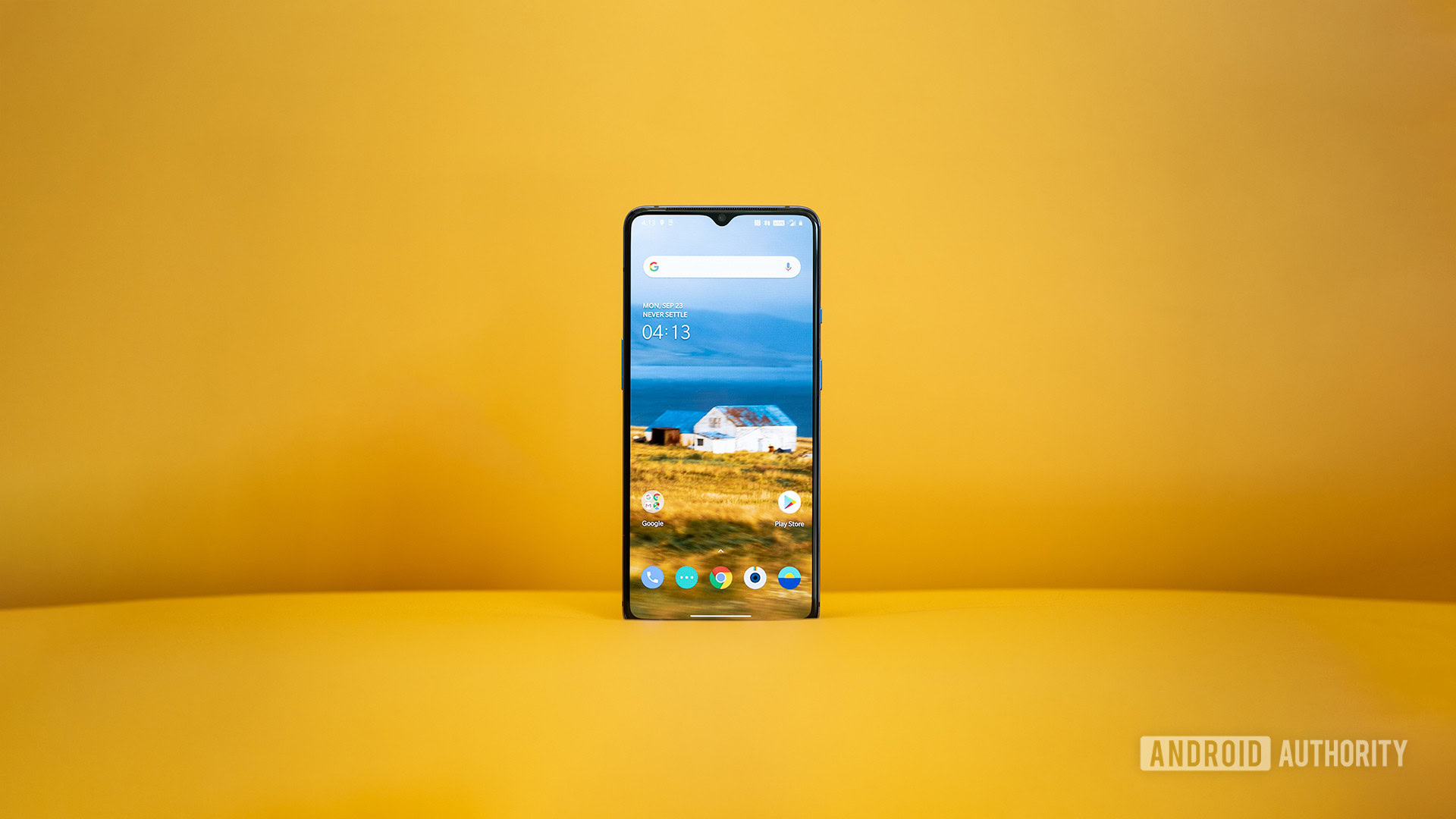
OnePlus 7T review: The pro you always wanted
OnePlus 7T
What we like
What we don't like
OnePlus 7T
Speed, value, and experience have always been a key part of OnePlus’ brand ethos. Its “fast and smooth” mantra has consistently delivered one of the most streamlined experiences on Android, at a price that is accessible to almost everyone. So, when OnePlus officially arrived in the United States with T-Mobile as its launch partner, a lot of people were elated. OnePlus sold 249% more OnePlus 6Ts in the US compared to OnePlus 6 devices, and OnePlus phones became the de-facto affordable Android purchase, at least for T-Mobile customers.
When the OnePlus 7 Pro launched, it still brought more value than just about any other phone on the market, but OnePlus was clearly aiming to compete in the premium sector versus dominating the mid-ranged pricing tier.
The OnePlus 7T is a true return to form for the company. It offers many of the same features as the OnePlus 7 Pro for under $600, and brings the Snapdragon 855 Plus and a 90Hz display to the masses.
This is Android Authority’s OnePlus 7T review.
OnePlus 7T review: The big picture
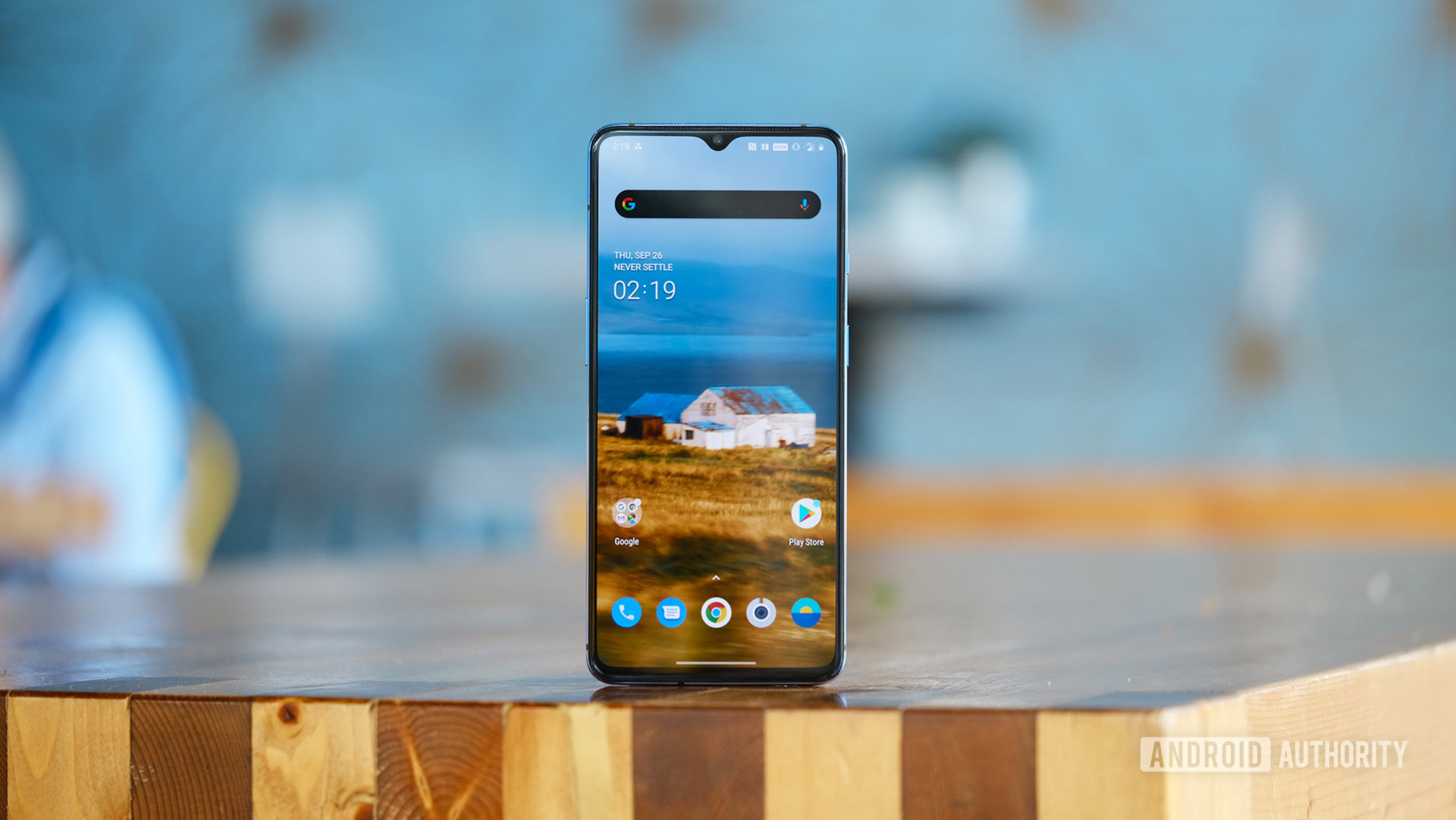
Historically, OnePlus has had two big product launches every year. There’s one big launch in the Spring that represents a full step, and one closer to the end of the year that improves the device with whatever new tech has come out since. The latter is the “T” variant device.
Last year’s OnePlus 6T bested the OnePlus 6 with the addition of an in-display fingerprint sensor, a bigger battery, and a smaller notch. This year’s T-variant is a much bigger leap forward. Since the OnePlus 7, the company added a bigger 90Hz display, a new triple-camera system, and the newest gaming-focused processor from Qualcomm. Effectively, this is the OnePlus 7 Pro in a different body, but it’s actually better in many ways.
The OnePlus 7T is targeted at customers who want one of the fastest devices on the market for a price that’s nearly half of its competitors. If you’ve enjoyed OnePlus devices before this, you’ll adore the 7T.
What’s in the box
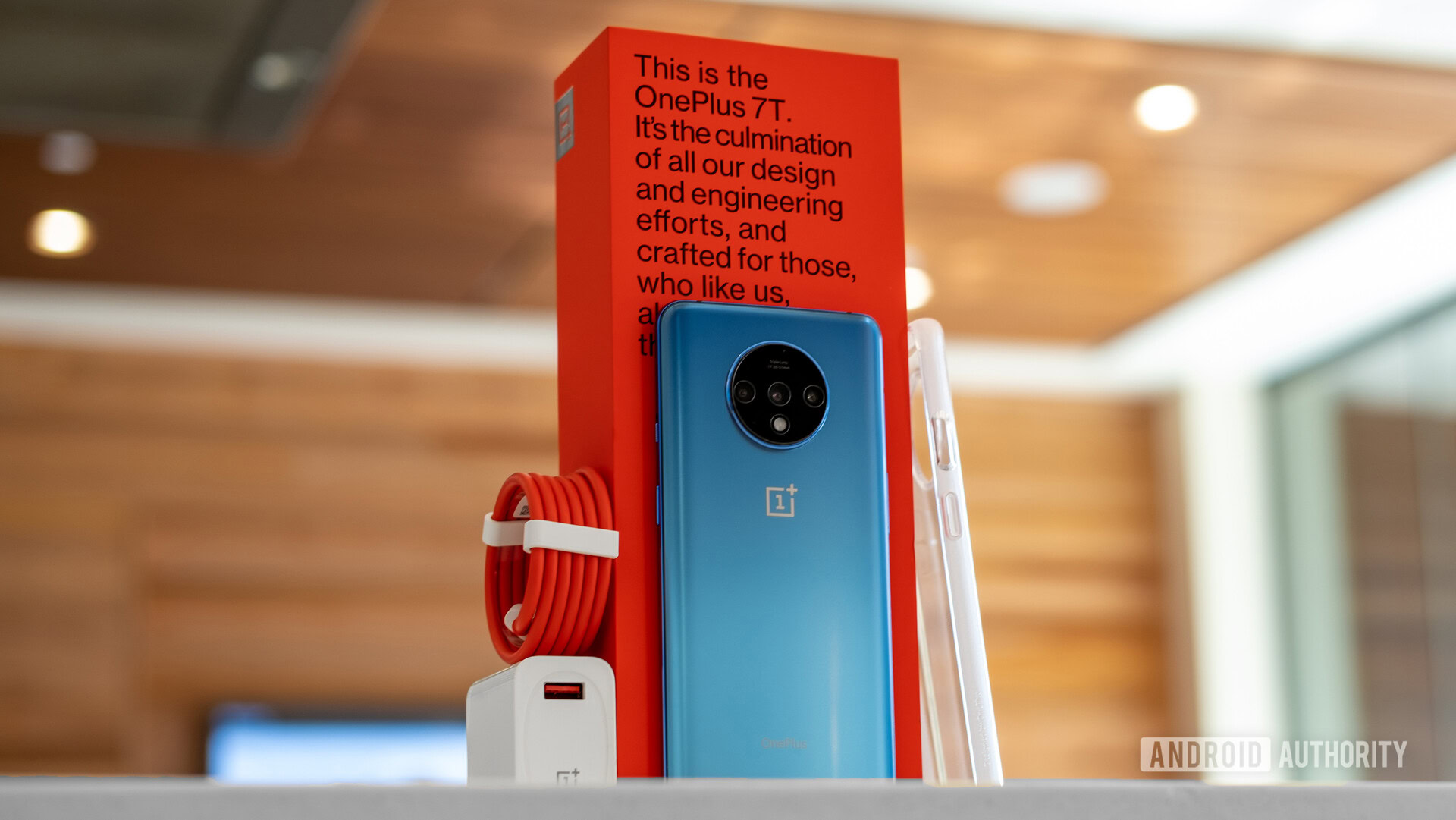
- 30W Warp Charge 30T charging brick
- USB-A to USB-C cable
- Clear TPU case
- Quick start guide
The OnePlus 7T comes with the company’s new Warp Charge 30T charger. This is a 30W brick, but OnePlus says it has optimized energy transfer so it can charge phones 27% faster than its Warp Charge 30 brick. As with the previous brick, the charger keeps the phone from getting too hot by converting the voltage to 5V at 6A in the charger itself, instead of handling the conversion on the device.
As with the OnePlus 7 Pro, the 7T also comes with a TPU case. We’re always happy to see additions like this in the box, but OnePlus makes some of the nicest first-party cases on the market. We strongly suggest you check one of those out if you’re picking up the 7T.
Design
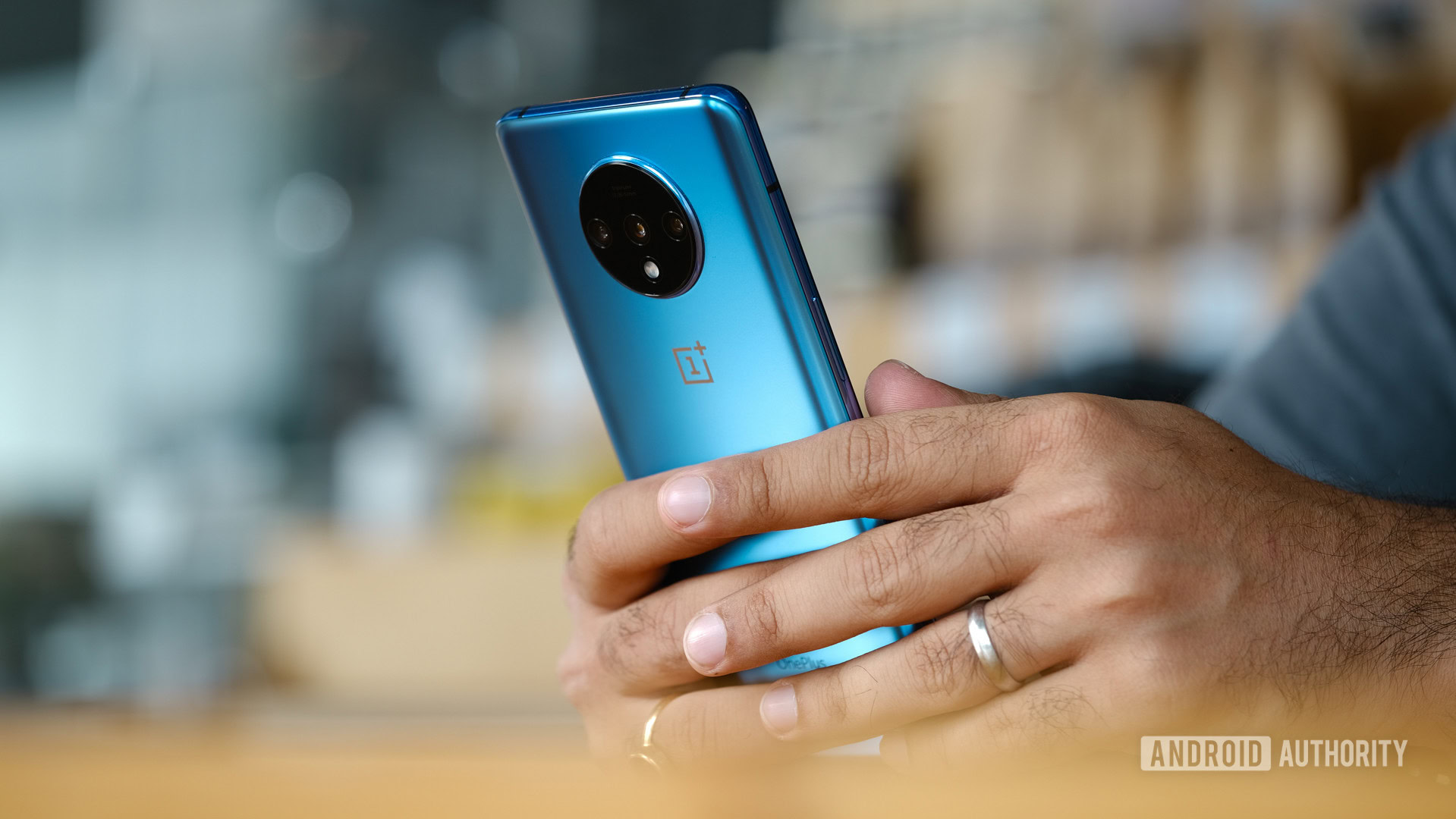
- 160.94 x 74.44 x 8.13mm
- 190g
- Teardrop selfie camera
- Flat edges
- Circular triple-camera system
- Stereo speakers
The OnePlus 7T looks similar to the OnePlus 7 on the front, but wildly different on the back. The display is slightly taller, giving it a longer 20:9 screen-to-body ratio. This extends the size of the display to 6.55 inches versus 6.41 inches on the OnePlus 7, and the change is noticeable in the hand. The phone feels a bit more candybar-shaped, and I’ve enjoyed the extra real-estate during my time with the device.
The waterdrop notch on the front has been scaled down a bit. While this isn’t incredibly noticeable versus the OnePlus 7, it’s nice to see OnePlus attempting to mitigate the notch as much as possible. Many of the devices the 7T competes against have eliminated the notch altogether at this point, and I’m sure OnePlus will continue to shrink the notch in its non-Pro devices over time.
The sides of the device look practically identical to the OnePlus 7 and OnePlus 6T. Volume buttons occupy the left edge, while the power button and signature notification switch are housed on the right. On the bottom, you’ll find a speaker, USB-C port, and a dual-SIM card tray.
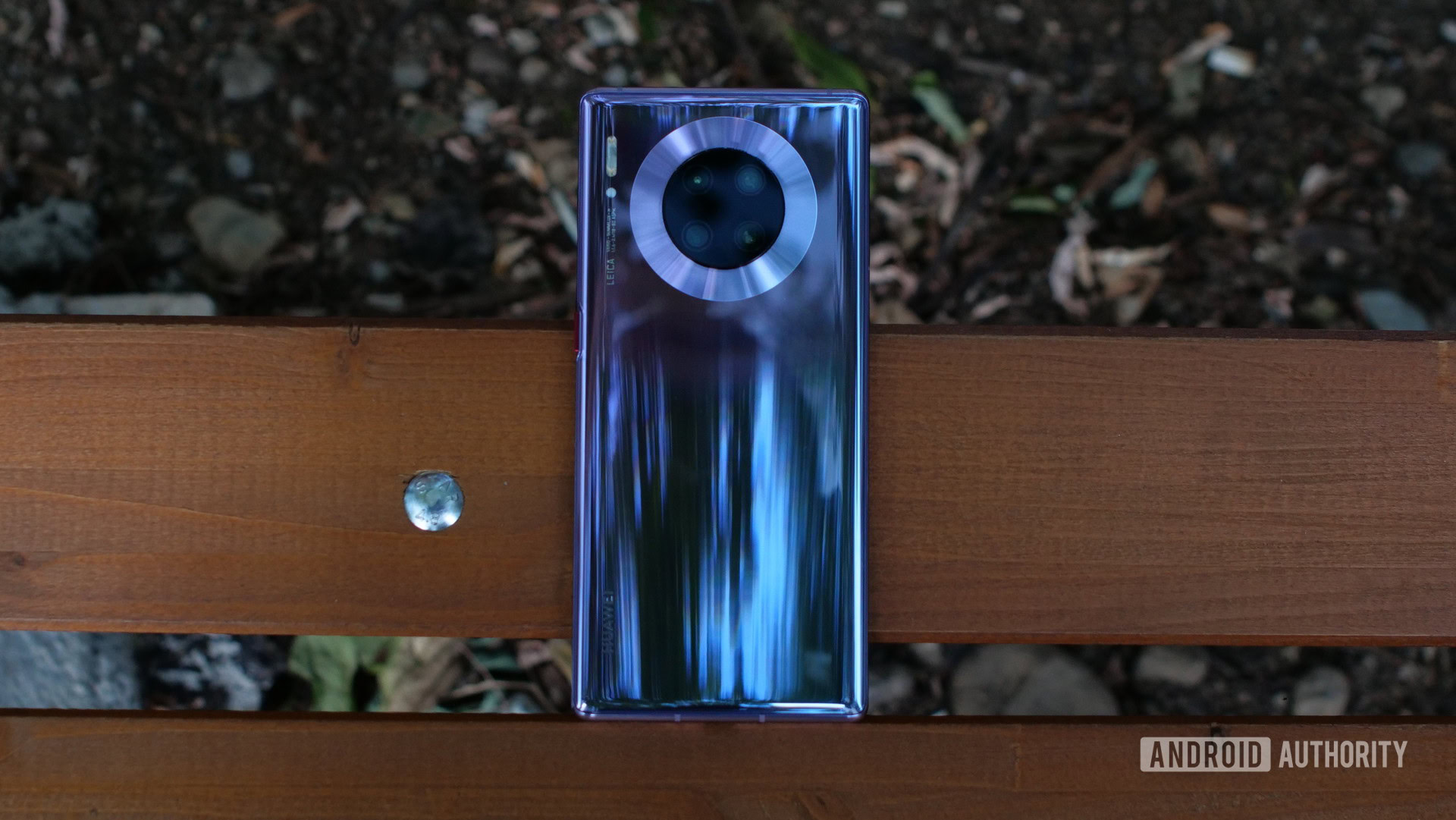
Things start to get interesting on the back of the phone. The device is wrapped in a familiar soft-touch glass — same as the OnePlus 6T, OnePlus 7, and OnePlus 7 Pro — but housed in that glass is an all-new camera module. The module is shaped in a circular design, similar to the HUAWEI Mate 30 Pro. This housing features nearly the same set of cameras as the OnePlus 7 Pro, but instead of a 3x telephoto camera you’ll find a 2x — without optical image stabilization. You’ll find a two-tone flash under the center lens.
Unfortunately, OnePlus hasn’t officially certified the OnePlus 7T with an IP rating. This is standard fare for the company. OnePlus says it does independent water-resistance testing in order to keep costs down. Even so, you probably shouldn’t take this phone in the shower with you.
Display

- 6.55-inch 90Hz AMOLED display
- 2,400 x 1,080 Full HD+ resolution
- 20:9 aspect ratio
- HDR10 / HDR+ certified, 42% less blue light
- 403ppi
- Optical in-display fingerprint sensor
OnePlus has put a big focus on displays over the last few years, and we’re happy to say the exceptional display quality of the OnePlus 7 Pro has trickled down to the new phone. The OnePlus 7T has a wonderful display.
OnePlus gave the 7T a 90Hz screen, and every time I switch back to a high refresh rate display I wonder how I ever did without one. Simply scrolling around the phone feels weird in the best way, since most displays you use on a daily basis are 50Hz or 60Hz. It’s really hard to understand the phenomenon without seeing it for yourself, so I recommend you go look at one in a carrier store.
This is one of the best displays I've ever seen on a smartphone, even at 1080p.
The OnePlus 7T is equally incredible in overall display quality. We put the device through our internal testing suite, and the 7T came out besting the Samsung Galaxy Note 10 Plus in a number of areas. Considering how much Samsung brags about the quality of its displays, this is a huge feat.
The Note 10 Plus bests the 7T in resolution, however, because OnePlus opted for a 1080p panel for this device. Resolution isn’t everything. The 7T came out ahead in every other area we tested, including color temperature, color accuracy, max brightness, and gamma accuracy. Overall, this 1080p panel looks absolutely incredible, and it is more visible outside due to its brighter lighting.
This panel is also HDR10 and HDR+ compatible, meaning it can properly display content with more color and contrast information between pure black and pure white. Services such as Netflix are actively adding HDR content for consumption (the OnePlus 7T comes with Netflix pre-installed). While I’m not a fan of pre-installed third-party software of any kind, it’s clear OnePlus wants consumers to experience HDR10 content on this device.
The in-display fingerprint reader in this device didn’t seem quite as fast or accurate as the OnePlus 7 Pro. I usually needed to try it a couple of times before it would unlock the device.
Performance
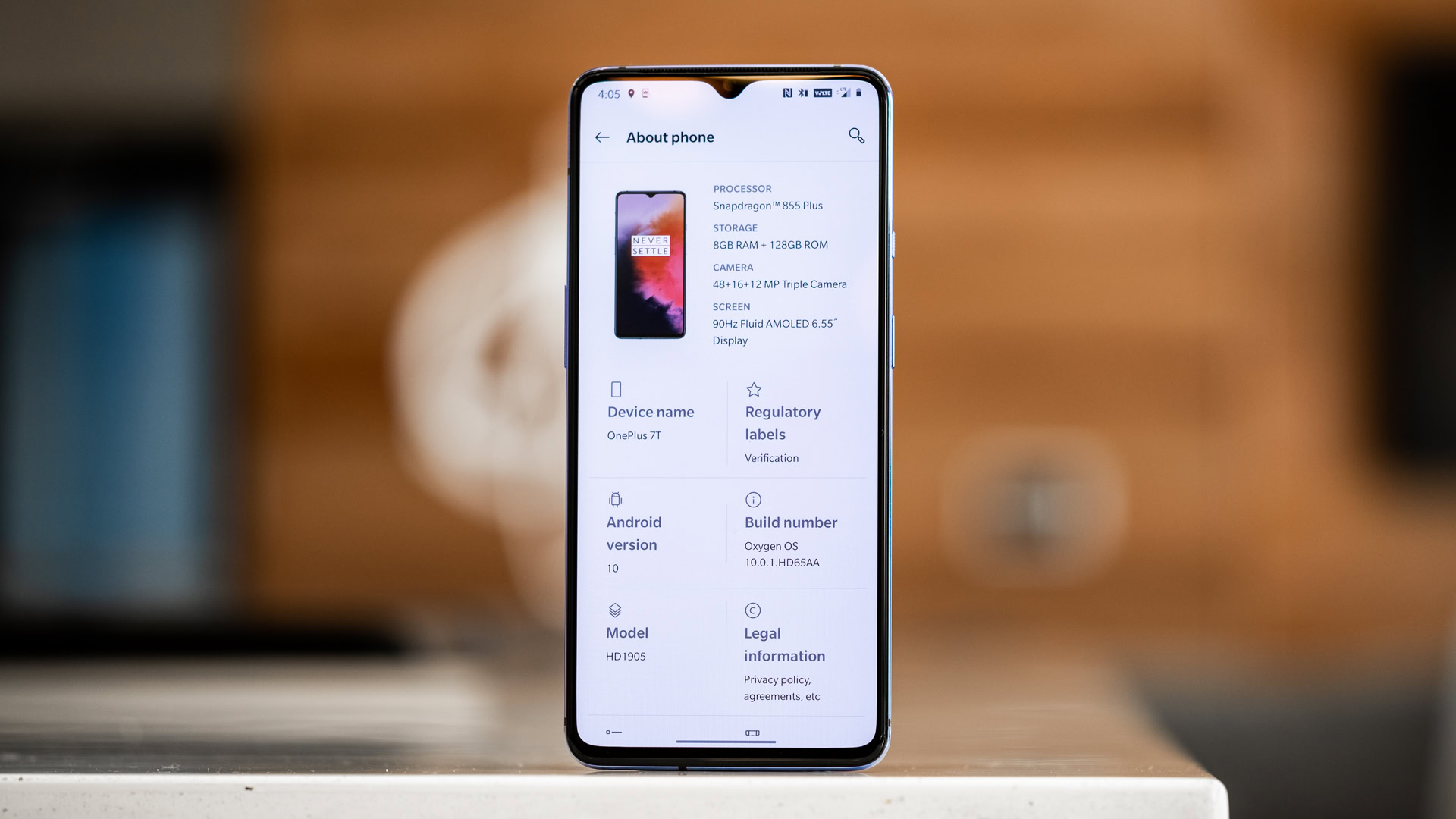
- Qualcomm Snapdragon 855 Plus
- Adreno 640 GPU
- 8GB of RAM
- 128GB of UFS 3.0 storage
OnePlus’ motto has long been “fast and smooth,” and it’s no surprise this device continues that heritage. Oxygen OS is already quite minimal and streamlined, but it’s the components under the hood that really keep this thing running so quickly.
The OnePlus 7T uses Qualcomm’s premier Snapdragon 855 Plus processor, which is only in a couple of devices so far. This chip is clearly focused on gaming, with a pretty significant 15% boost to the GPU over the 855. Considering OnePlus devices have long been considered undercover gaming phones, this jump makes sense. Honestly, I’m impressed OnePlus was able to offer this chip at this price point.
The other hardware feature keeping the device running quickly is the UFS 3.0 storage. The company first introduced this much-faster storage option with the OnePlus 7 Pro, and it’s equally incredible that this feature has trickled down to the more affordable device so quickly.
128GB is the only storage SKU OnePlus is offering with this device in the US, but I think this will be totally fine for most users. There is, unfortunately, no microSD card expansion available in the 7T.
Considering OnePlus is only offering one spec SKU for this phone, it’s nice to see 8GB of RAM here as well. OnePlus has long been known for offering killer specs at a killer price, and that continues here.
In benchmarks, the OnePlus 7T scores extremely well. It achieved a score of 400,713 in AnTuTu versus 369,029 on the Samsung Galaxy Note 10 Plus. In 3DMark, it achieved a score of 6,163 and 5,408, respectively, in OpenGL and Vulcan. This is compared to 5,692 and 5,239 on the Note 10 Plus. In Geekbench, it nabbed 3,690 and 11,452 for the single-core and multi-core tests, respectively, versus the Note 10 Plus’ scores of 3,434 and 10,854. In Gary’s Speed Test G, the OnePlus 7 Pro finished the course in 1 minute 30 seconds, tying the Samsung Galaxy Note Plus almost exactly.
Battery
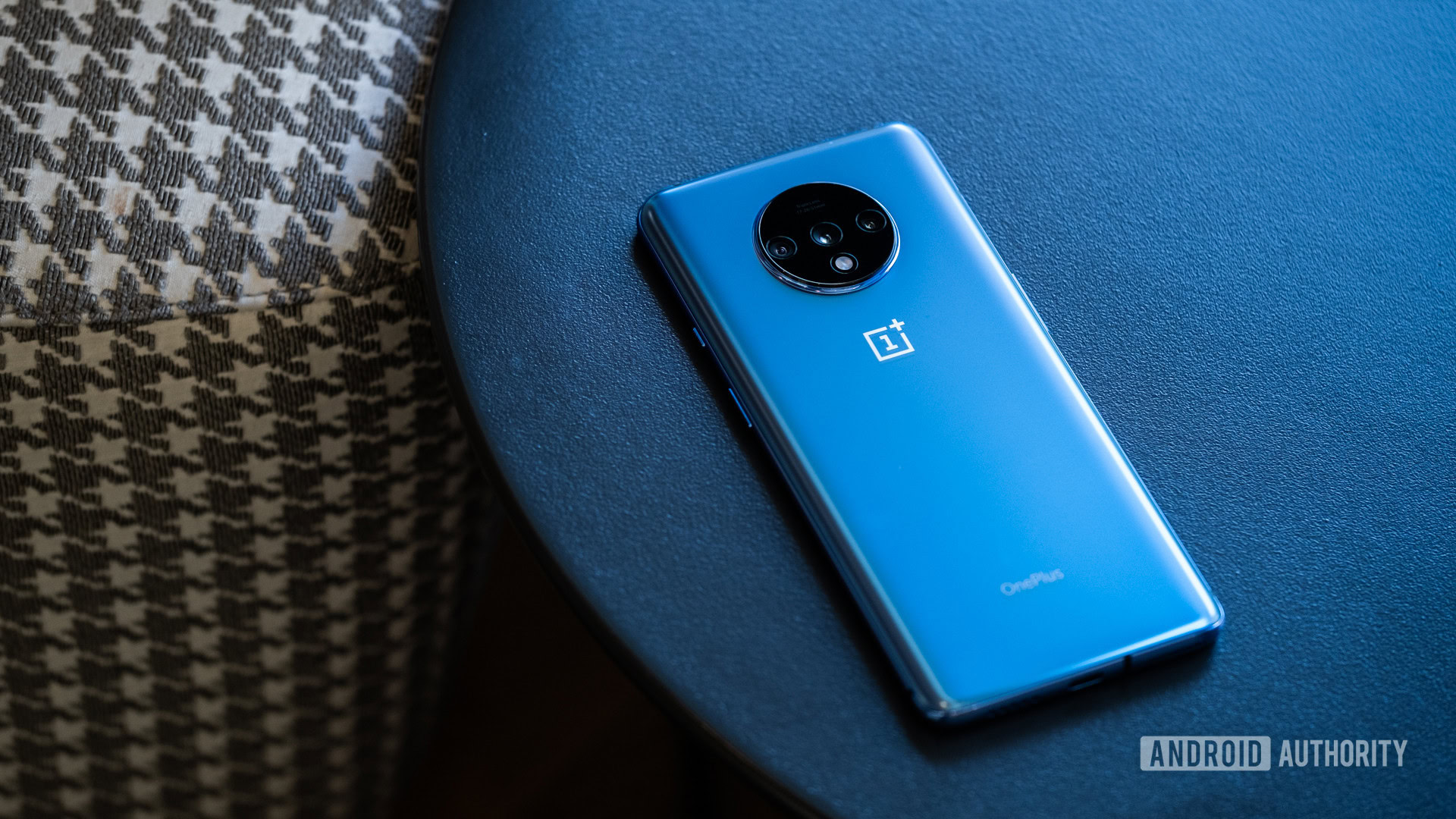
- 3,800mAh
- 30W charging
- No wireless charging
The OnePlus 7T suffers from so-so battery life. OnePlus bumped the capacity to 3,800mAh versus 3,700mAh on the OnePlus 7, but the combination of the 90Hz display and higher-energy processor make this phone deliver average battery life at best. The battery lasts about as long as the Samsung Galaxy Note 10 Plus in our testing. Most days I was able to go from unplugging in the morning to after work no problem, but I often needed to give my phone a jump if I planned to go out for the night. If you care, I got about five hours and forty-five minutes of screen-on time by the time I reached five percent.
Fortunately, OnePlus includes a 30W charger with this device. The new Warp Charge 30T charger is also more efficient than the Warp Charge 30 charger included with the OnePlus 7 and OnePlus 7 Pro. The company says the new charger charges 23% faster. In our independent testing, we found it charged about 12% faster. The OnePlus 7T was able to charge from 0 to 100% in 70 minutes versus 81 minutes on the OnePlus 7, though that phone does have a 100mAh smaller battery. The 7T also charged to 75% in exactly half an hour, which gives you time to freshen up before a night out.
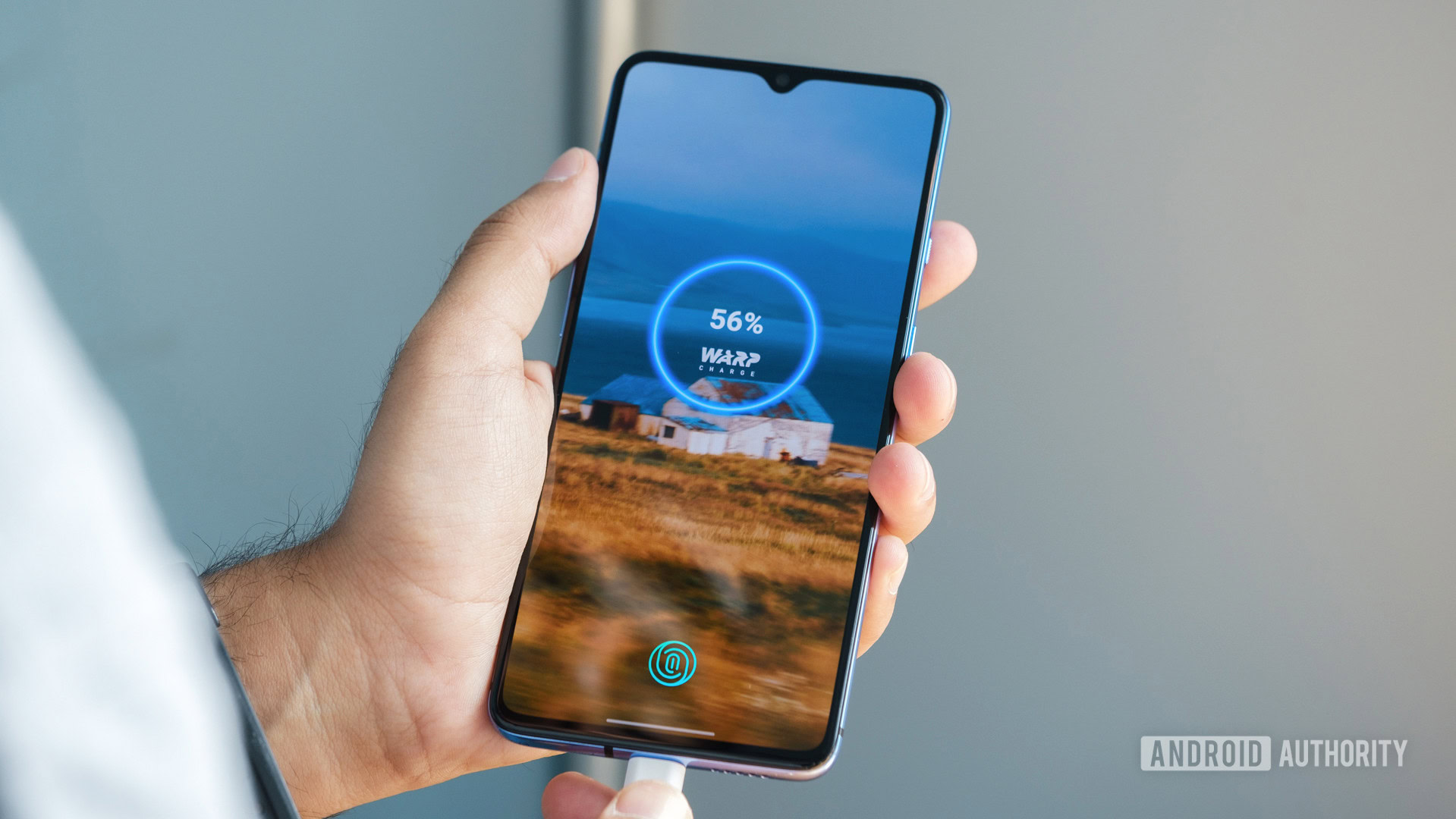
The Warp Charge 30T charger performs power management in the brick itself, which is meant to keep the device cool while charging, and it works fairly well. You can definitely feel the phone heat up, but it’s not bad at all; it stays much cooler than the OnePlus 7 Pro while charging.
There is no wireless charging in this device, which is a bit of a shame, but I think OnePlus is waiting for higher-speed wireless charging to become more standardized before it adds that feature.
Camera
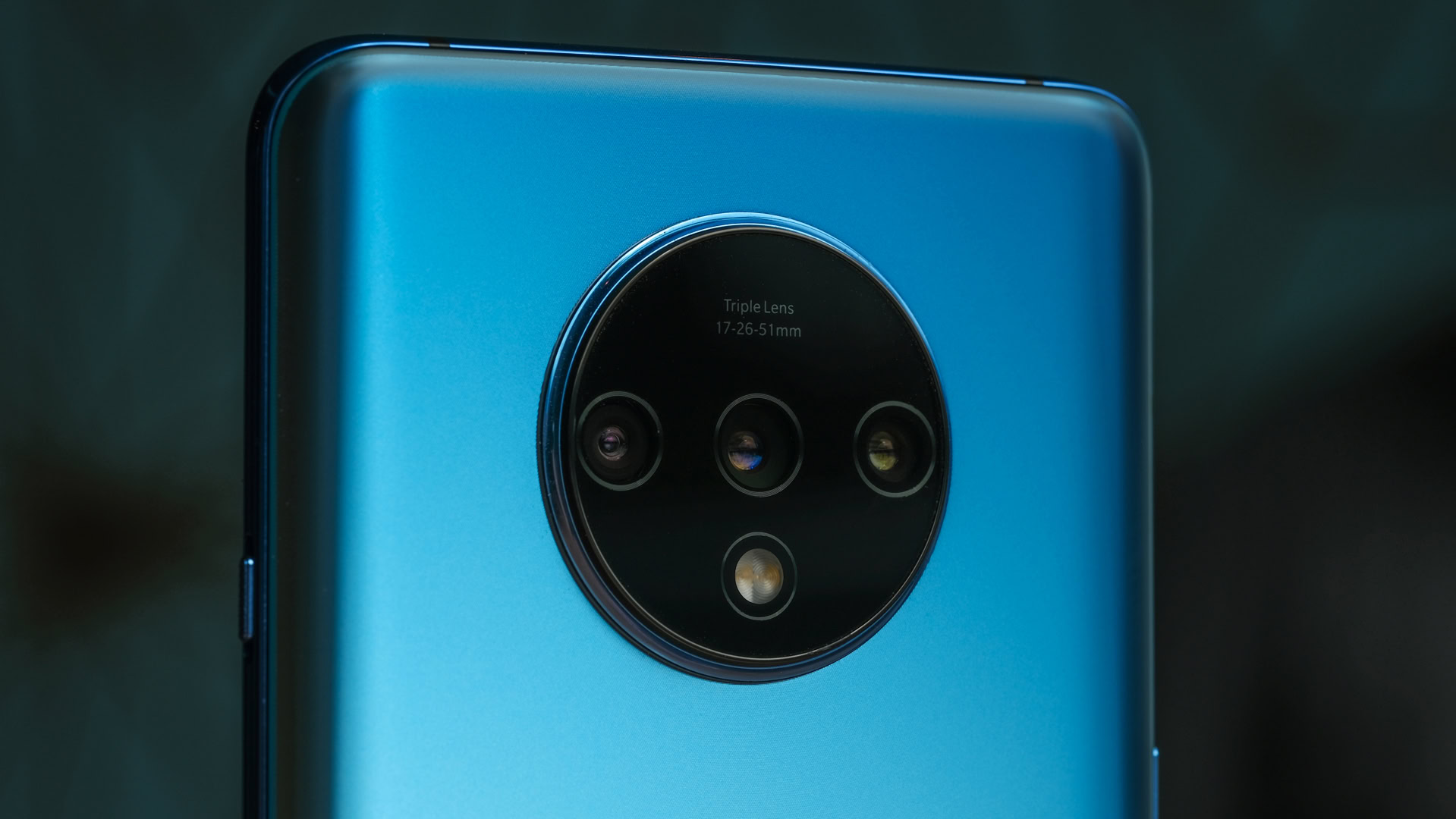
- Standard: 48MP, f/1.6, OIS
- Pixel-binned images at 12MP
- Wide-angle: 13MP, f/2.2, 117-degree FoV
- 2x telephoto: 12MP, f/2.2
- Teardrop selfie camera: 16MP, f/2.0
Traditionally, OnePlus cameras haven’t been amazing. The company always touted bigger pixels and better low-light performance, but for a number of years we haven’t seen huge improvements. So, it was a surprise when the company started releasing rapid camera software updates for the OnePlus 7 Pro. At launch, the 7 Pro had a decent set of cameras, but they weren’t fantastic. Over time though, the images got better and better, and at this point, they are pretty damn good.
At this price, this is one of the best daylight cameras you can get on a smartphone.
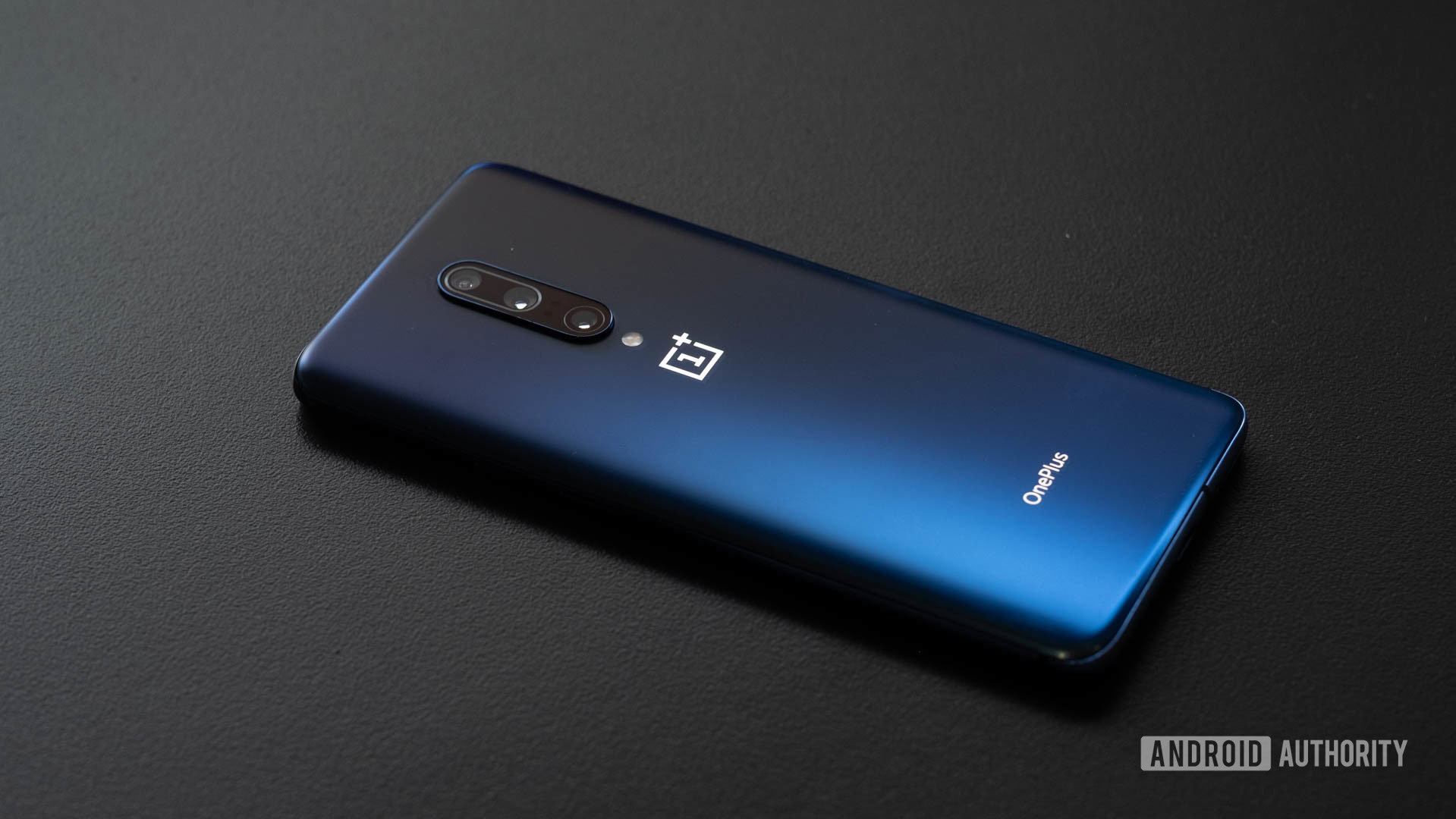
Continuing the trickle-down story of the OnePlus 7T, the company ported the improved camera software to this device. In good light, the images that come out of this phone are fantastic. For a device that costs just $499, this has got to be one of the best cameras available right now.
The OnePlus 7T has three cameras on the rear, similar to the OnePlus 7 Pro. The main camera is the 48MP Sony IMX 586, which pixel-bins images to 12MP for better light gathering. The wide camera is technically a 13MP sensor, but it produces 12MP images. OnePlus does this in order to enable electronic image stabilization in video without noticeable cropping. The third camera is a 2x telephoto lens, down from the 3x telephoto shooter in the OnePlus 7 Pro. Unfortunately, there is no optical image stabilization in the telephoto lens, so you’ll need to hold a little more steady when using that shooter. The telephoto lens is 12MP.
Images are sharp, but not over-sharpened, and colors are overall great. There is a noticeable difference in the color profiles of the wide, standard, and telephoto cameras. It’s likely due to auto white balance using different sources at the different focal lengths.
Dynamic range is very good, but it can be a tad aggressive if there is a lot of contrast in the image. This is typical of smartphone cameras, as they try to balance shadows and highlights. In balanced light, I love the color profile the OnePlus 7T produces. It can feel very moody in a good way, and it’s really nice to get such stylized images straight out of the camera. Check out the wide angle shot of the buildings above to see what I mean.
OnePlus also tends to improve its camera software frequently, so I wouldn’t be surprised if we got a lot of updates for this device in a short amount of time.
OnePlus has added a motor to the camera system to allow for super macro shots, and the resulting images are pretty amazing. You can see individual fibers in things, and I feel that phone cameras are finally starting to become tools for everyday life.
The selfie camera in this device is also very good. Images are sharp and have good color, and even look decent in low-light situations. This isn’t the greatest selfie camera on the market, but for a notch that was shrunk by 31.6%, it’s pretty decent.
Overall, I’m incredibly impressed with the camera system in this device. At this price range, it’s hard to beat this shooter unless you compare it to the Pixel 3a.
Software
- Oxygen OS 10
- Android 10
The OnePlus 7T is running on Oxygen OS 10 based on Android 10, making it one of the first devices to ship with Android’s newest release. The update brings more obvious changes like new navigation gestures and an option for dark mode, but OnePlus says there are over 370 tweaks and optimizations in the software. Other changes include a new reading mode that can show low-gamut color, an extended Zen Mode for longer breaks, and Game Space, which optimizes games on your device for high-fidelity play.
Don’t miss: Inside Google’s massive Android rebrand
Oxygen OS, OnePlus’ Android skin, is one of my favorites. It’s simple and streamlined, and it additions to vanilla Android are actually useful. You’ve got a built-in screen recorder, reading mode, gaming mode, and more, and I love how OnePlus is able to make its OS so full-featured while also feeling streamlined.
My only problem with this version of Oxygen OS is the new gesture system. This is based on Android 10’s gestures, so it’s not completely OnePlus’ fault, but it needs some tweaking. You swipe up to go home, pull in from the left or right to go back, and swipe up and hold to multitask. I often had trouble multitasking, and the phone would immediately pull focus back to the app I was just in. You really need to hold for the multitasking menu to pop up, and I think this could be improved.
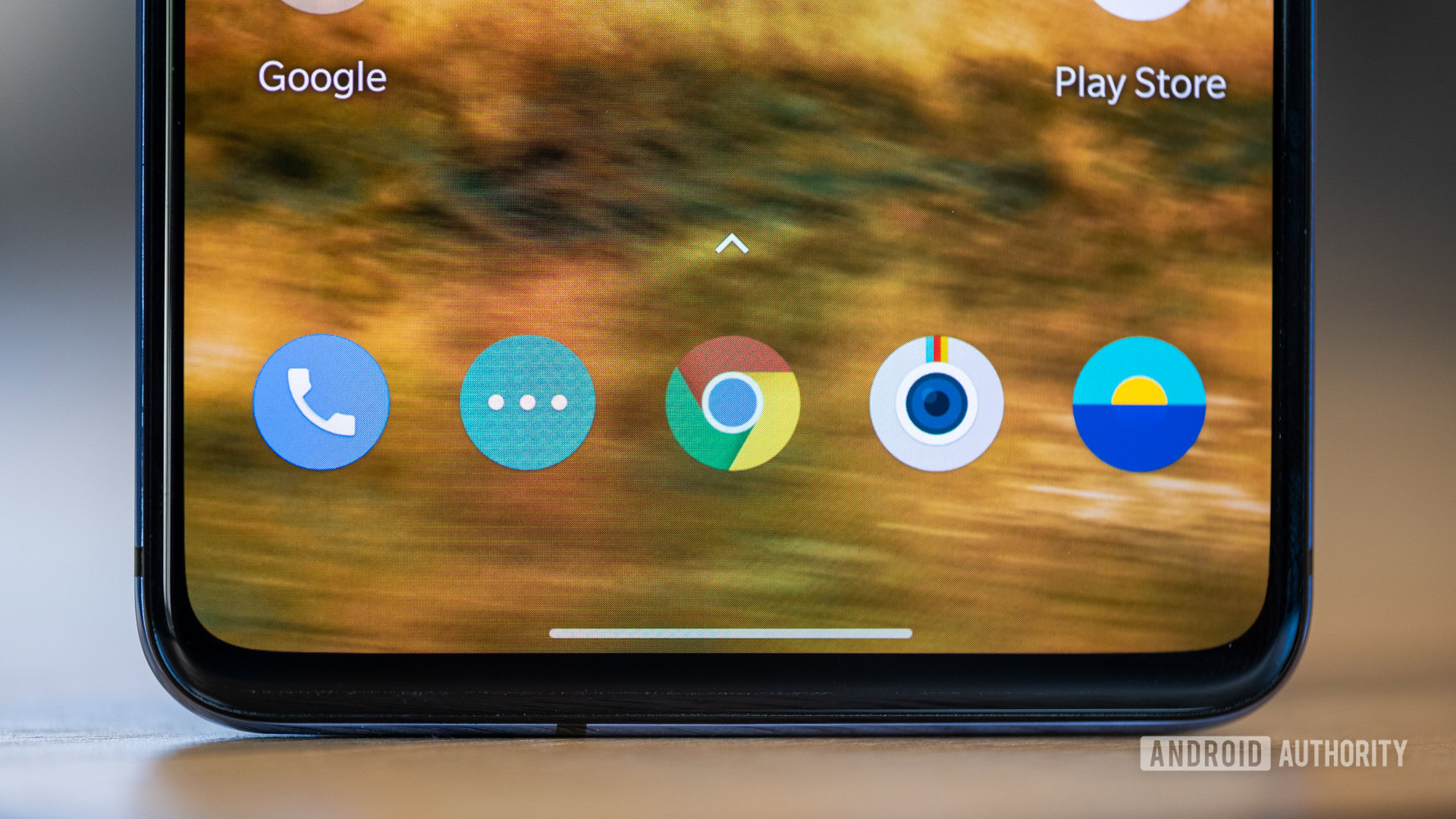
If you want to see all the major changes in Oxygen OS 10, take a look at our dedicated article here. The OS has already made its way to the OnePlus 7 Pro, and the company is one of the fastest to push Android version updates to its devices.
UPDATE: March 16, 2020 (1:00PM ET): The OnePlus 7T is still on the January 2020 security patch, which isn’t a good look. While being 2 months late to a security patch probably won’t impact your experience, we keep a hard look on devices to make sure they’re updated on time.
Audio
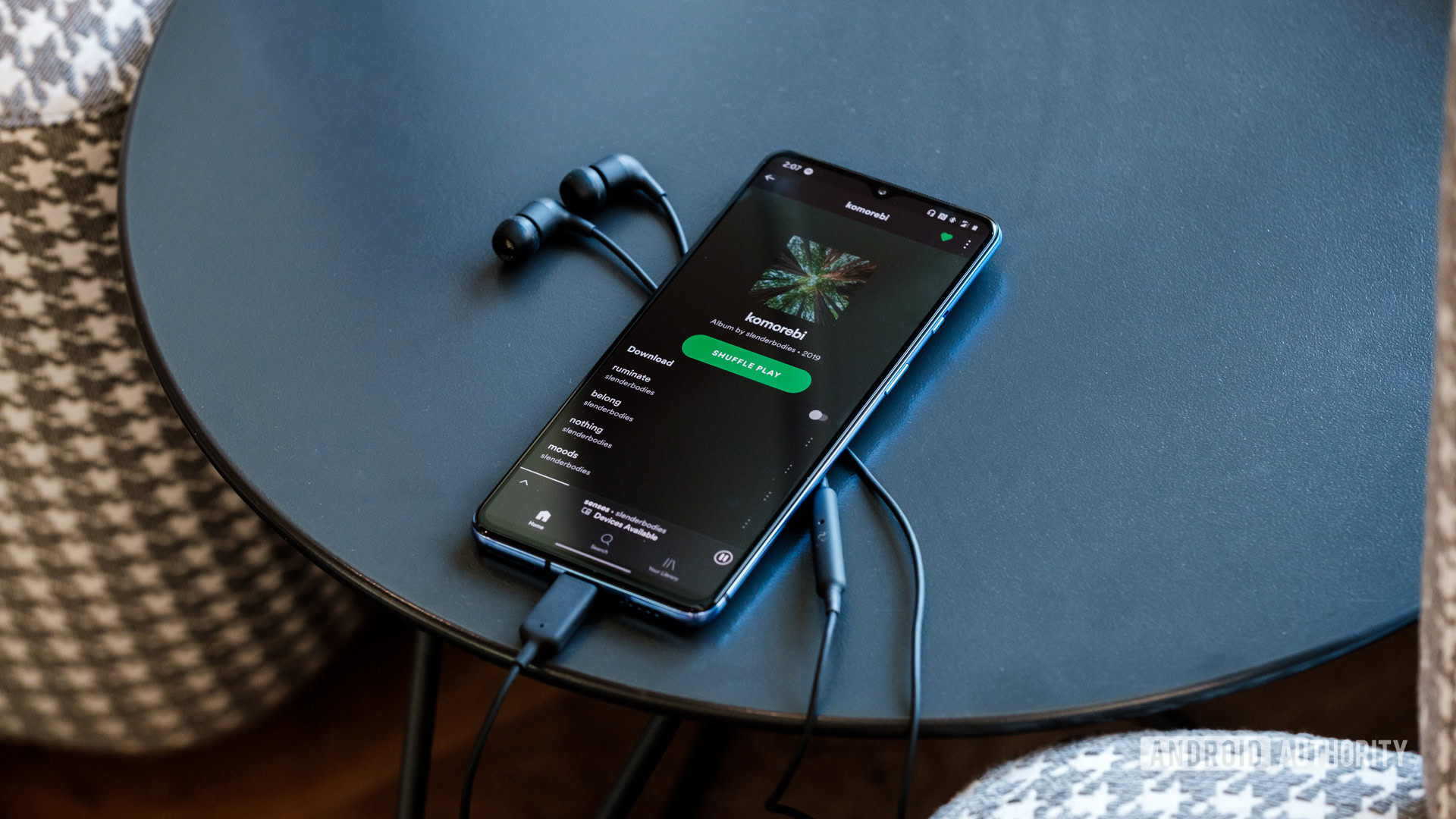
- No headphone jack
- Stereo speakers
- Dolby Atmos certified
The OnePlus 7T doesn’t have a headphone jack, but it does have dual stereo speakers, and they get super loud. When I tested them against the Samsung Galaxy Note 10 Plus, they were noticeably louder and didn’t seem to distort at all, even at max volume. The bass was a bit lacking comparatively, but it felt like the audio was more separated. All in all, I really like these speakers, and I think you’ll like them too if you’re listening to music without an external source.
If you are using Bluetooth, the OnePlus 7T supports Bluetooth 5, aptX, aptX HD, LDAC and AAC.
OnePlus 7T specs
| OnePlus 7T | |
|---|---|
Display | 6.55-inch AMOLED 2,400 x 1,080p FHD+ 402ppi 20:9 aspect ratio Corning Gorilla Glass 6 HDR10 / HDR+ certified 90Hz fluid display |
SoC | Qualcomm Snapdragon 855 Plus Octa-core, 7nm |
GPU | Adreno 640 |
RAM | 8GB LPDDR4X |
Storage | 128GB UFS 3.0 No microSD expansion |
Cameras | Rear cameras Main: Sony IMX586 48MP sensor, f/1.6 aperture, OIS Wide: 16MP sensor, f/2.2 aperture, 117 degree field-of-view 2x telephoto: 12MP sensor, f/2.4 aperture, OIS Video: 4K resolution video at 30/60fps Front camera Main: Sony IMX4791 16MP sensor, f/2.0 aperture, EIS Video: 1080P video at 30fps |
Audio | USB 3.1 Type-C No headphone jack Stereo speakers Dolby Atmos certified |
Battery | 3,800mAh battery Non-removable Warp Charge 30T (5V, 6A) |
IP rating | N/A |
Sensors | Optical in-display fingerprint sensor Accelerometer Gyroscope Proximity Ambient light sensor Electronic compass Sensor hub |
Network | LTE: Supports 5xCA, 64QAM, 256QAM & 4x4 MIMO, up to DL CAT16 (1Gbps)/UL CAT13 (150 Mbps) depending on carrier support NA/EU: FDD LTE: Band 1/2/3/4/5/7/8/12/13/17/18/19/20/25/26/28/29/30/32/66/71 TDD LTE: Band 34/38/39/40/41/46 TD-SCDMA: Band 34/39 UMTS(WCDMA): Band 1/2/4/5/8/9/19 CDMA: BC0/BC1GSM: 850/900/1800/1900 MHz CN/IN: FDD LTE: Band 1/2/3/4/5/7/8/1213/17/18/19/20/25/26/28/29/66 TDD LTE: Band 34/38/39/40/41 TD-SCDMA: Band 34/39 UMTS(WCDMA): Band 1/2/4/5/8/9/19 CDMA: BC0/BC1 GSM: 850/900/1800/1900 MHz |
Connectivity | Wi-Fi: 2x2 MIMO, Wi-Fi 802.11 a/b/g/n/ac, 2.4G/5G Bluetooth 5.0, support aptX & aptX HD NFC GPS, GLONASS, BeiDou, Galileo WLAN |
SIM | Dual nano-SIM slot (single on T-Mobile model) |
Software | OxygenOS based on Android 10 |
Colors | Frosted Silver, Glacial Blue |
In the box | Screen protector (pre-applied) Translucent phone case OnePlus Fast Charge Type-C cable OnePlus Warp Charge 30T power adapter SIM tray ejector Quick start guide Safety information |
Value for money
- OnePlus 7T: 8GB RAM, 128GB of storage — $499
For $499, the OnePlus 7T offers a ridiculous amount of value. The specs in this device best nearly every Android phone on the market right now, at a price nearly half that of its nearest competitors.
If you want to pay less and still get a great experience, the Pixel 3a XL ($479) is still a great option. Google’s phone has an incredible camera, great software, and Android 10, and can be had for three-quarters the cost of the 7T.
If you’re looking for a bigger phone with a lot of brawn for a the same cost, OnePlus is still selling the OnePlus 7 Pro for $499. The 7 Pro has a bigger display at a higher resolution and the same 90Hz display and UFS 3.0 storage. With that said, the processor is technically slower, but still one of the best on the market.
If you want one of the best gaming phones on the market today, you also can’t go wrong with the ASUS ROG Phone 2 ($899). It has the same processor and UFS 3 storage as the 7T, but bests it with a faster 120Hz AMOLED display, more storage and RAM, and a headphone jack.
If you want to go out and buy a phone made for luxury, the Samsung Galaxy Note 10 Plus ($1,099) is a great choice. The S Pen is great for digital artists and the screen and form factor are wonderful.
For the newest processor out there, it’s hard to go wrong with the Samsung Galaxy S20 Plus ($1,199). This is the Samsung Galaxy phone we recommend most people buy, with an incredible 120Hz screen and a Qualcomm Snapdragon 865.
And finally, if you’re looking for a foldable device, we recommend the Samsung Galaxy Z Flip ($1,380). This is the only foldable phone you should buy right now, especially with the Samsung Galaxy Fold 2 likely releasing in the next few months.
The OnePlus 7T is one of the best devices OnePlus has made in years.
OnePlus 7T review: The verdict
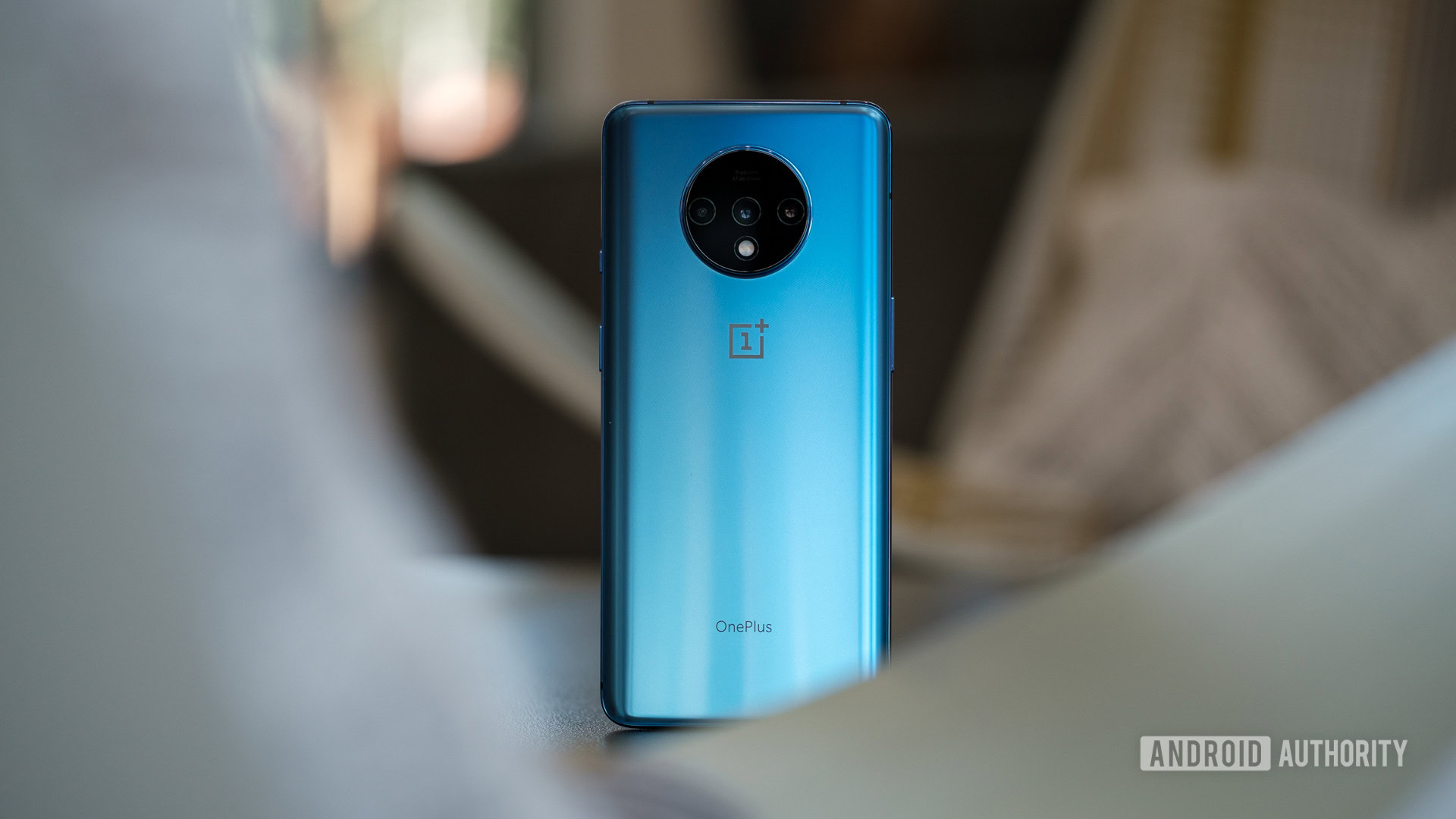
The OnePlus 7T is one of the best devices OnePlus has made in years. It has some the best specs available on the market, the latest Android has to offer, and a great camera system, all for $499.
Personally, I feel the 7T puts the OnePlus 7 Pro in an even weirder position than before. The 7T is cheaper with better specs (minus screen resolution and battery capacity). Sure, the 7 Pro offers the pop-up selfie camera, but the notch in this device really doesn’t bother me.
If you’re shopping for a new smartphone, the OnePlus 7T is a no-brainer. If you need a headphone jack, incredible battery life, or a high-resolution display you’ll need to shop elsewhere. But if you’re looking for a phone that does everything well — and is a lot of fun to use — it’s hard not to instantly recommend the OnePlus 7T.
That’s it for our OnePlus 7T review. Need more OnePlus in your life? We’ve got you covered:
OnePlus 7T in the news
Thank you for being part of our community. Read our Comment Policy before posting.